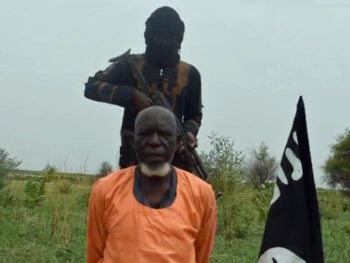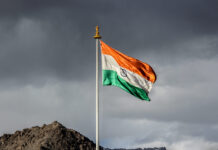Islamic terror group Boko Haram recently shared on social media a video of Pastor Paul Musa pleading for his life as an armed, masked Islamic extremist stands behind him.
Musa pleading for his life as an armed, masked Islamic extremist stands behind him.
Boko Haram abducted the 59-year-old pastor and his wife, Ruth, 50, in March 2023 from their home in Borno state, Nigeria. In the video, the pastor is wearing orange clothing, reminiscent of the orange jumpsuits worn by the 21 Egyptian Coptic Christians that the Islamic State group beheaded on a beach in Libya in 2015.
According to an International Christian Concern (ICC) source in Nigeria, Boko Haram reportedly demanded the pastor’s family pay two hundred million Nigerian Naira, or roughly $130,000, by Monday, or Pastor Musa would be killed.
Since 2009, Islamic extremists such as Boko Haram, Islamic State West African Province (ISWAP), Islamic Fulani militants, and unidentified gunmen have killed an estimated 45,000 Christians. Earlier this month, members of ISWAP executed three Christians in Borno state. These groups also continue to kidnap pastors and priests and hold them for ransom.
For years, and again this year, the ongoing attacks, kidnappings, and executions of Christians have prompted the United States Commission on International Religious Freedom (USCIRF) to recommend that the U.S. Department of State designate Nigeria as a Country of Particular Concern (CPC). This year’s report also called for Boko Haram and ISWAP to be designated Entities of Particular Concern (EPC).
Michael Kurams, executive director of Living Streams of Hope and Peace Foundation, told an ICC staffer that there must be a more robust international response to the persecution of Christians in Nigeria.
“There is an urgent need for diplomatic pressure on the Nigerian government to prioritize the safety and rights of its Christian citizens,” he told ICC. “Additionally, providing support to local and international organizations working on the ground can help offer some measure of protection and assistance to those in need.” International Christian Concern





